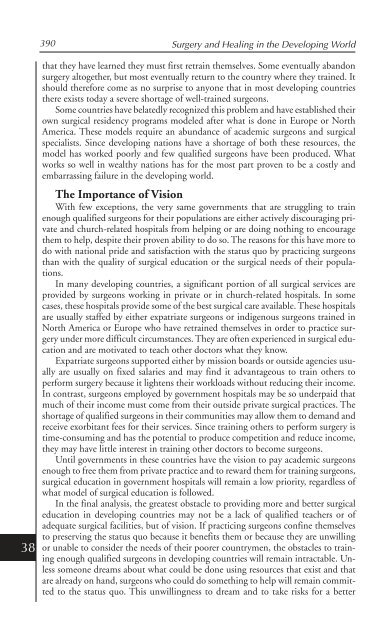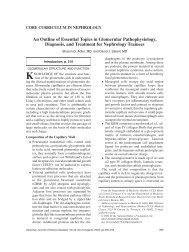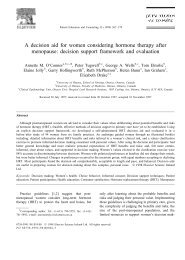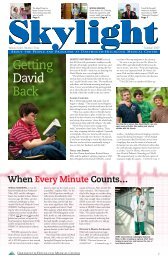Surgery and Healing in the Developing World - Dartmouth-Hitchcock
Surgery and Healing in the Developing World - Dartmouth-Hitchcock
Surgery and Healing in the Developing World - Dartmouth-Hitchcock
You also want an ePaper? Increase the reach of your titles
YUMPU automatically turns print PDFs into web optimized ePapers that Google loves.
38<br />
390 <strong>Surgery</strong> <strong>and</strong> <strong>Heal<strong>in</strong>g</strong> <strong>in</strong> <strong>the</strong> Develop<strong>in</strong>g <strong>World</strong><br />
that <strong>the</strong>y have learned <strong>the</strong>y must first retra<strong>in</strong> <strong>the</strong>mselves. Some eventually ab<strong>and</strong>on<br />
surgery altoge<strong>the</strong>r, but most eventually return to <strong>the</strong> country where <strong>the</strong>y tra<strong>in</strong>ed. It<br />
should <strong>the</strong>refore come as no surprise to anyone that <strong>in</strong> most develop<strong>in</strong>g countries<br />
<strong>the</strong>re exists today a severe shortage of well-tra<strong>in</strong>ed surgeons.<br />
Some countries have belatedly recognized this problem <strong>and</strong> have established <strong>the</strong>ir<br />
own surgical residency programs modeled after what is done <strong>in</strong> Europe or North<br />
America. These models require an abundance of academic surgeons <strong>and</strong> surgical<br />
specialists. S<strong>in</strong>ce develop<strong>in</strong>g nations have a shortage of both <strong>the</strong>se resources, <strong>the</strong><br />
model has worked poorly <strong>and</strong> few qualified surgeons have been produced. What<br />
works so well <strong>in</strong> wealthy nations has for <strong>the</strong> most part proven to be a costly <strong>and</strong><br />
embarrass<strong>in</strong>g failure <strong>in</strong> <strong>the</strong> develop<strong>in</strong>g world.<br />
The Importance of Vision<br />
With few exceptions, <strong>the</strong> very same governments that are struggl<strong>in</strong>g to tra<strong>in</strong><br />
enough qualified surgeons for <strong>the</strong>ir populations are ei<strong>the</strong>r actively discourag<strong>in</strong>g private<br />
<strong>and</strong> church-related hospitals from help<strong>in</strong>g or are do<strong>in</strong>g noth<strong>in</strong>g to encourage<br />
<strong>the</strong>m to help, despite <strong>the</strong>ir proven ability to do so. The reasons for this have more to<br />
do with national pride <strong>and</strong> satisfaction with <strong>the</strong> status quo by practic<strong>in</strong>g surgeons<br />
than with <strong>the</strong> quality of surgical education or <strong>the</strong> surgical needs of <strong>the</strong>ir populations.<br />
In many develop<strong>in</strong>g countries, a significant portion of all surgical services are<br />
provided by surgeons work<strong>in</strong>g <strong>in</strong> private or <strong>in</strong> church-related hospitals. In some<br />
cases, <strong>the</strong>se hospitals provide some of <strong>the</strong> best surgical care available. These hospitals<br />
are usually staffed by ei<strong>the</strong>r expatriate surgeons or <strong>in</strong>digenous surgeons tra<strong>in</strong>ed <strong>in</strong><br />
North America or Europe who have retra<strong>in</strong>ed <strong>the</strong>mselves <strong>in</strong> order to practice surgery<br />
under more difficult circumstances. They are often experienced <strong>in</strong> surgical education<br />
<strong>and</strong> are motivated to teach o<strong>the</strong>r doctors what <strong>the</strong>y know.<br />
Expatriate surgeons supported ei<strong>the</strong>r by mission boards or outside agencies usually<br />
are usually on fixed salaries <strong>and</strong> may f<strong>in</strong>d it advantageous to tra<strong>in</strong> o<strong>the</strong>rs to<br />
perform surgery because it lightens <strong>the</strong>ir workloads without reduc<strong>in</strong>g <strong>the</strong>ir <strong>in</strong>come.<br />
In contrast, surgeons employed by government hospitals may be so underpaid that<br />
much of <strong>the</strong>ir <strong>in</strong>come must come from <strong>the</strong>ir outside private surgical practices. The<br />
shortage of qualified surgeons <strong>in</strong> <strong>the</strong>ir communities may allow <strong>the</strong>m to dem<strong>and</strong> <strong>and</strong><br />
receive exorbitant fees for <strong>the</strong>ir services. S<strong>in</strong>ce tra<strong>in</strong><strong>in</strong>g o<strong>the</strong>rs to perform surgery is<br />
time-consum<strong>in</strong>g <strong>and</strong> has <strong>the</strong> potential to produce competition <strong>and</strong> reduce <strong>in</strong>come,<br />
<strong>the</strong>y may have little <strong>in</strong>terest <strong>in</strong> tra<strong>in</strong><strong>in</strong>g o<strong>the</strong>r doctors to become surgeons.<br />
Until governments <strong>in</strong> <strong>the</strong>se countries have <strong>the</strong> vision to pay academic surgeons<br />
enough to free <strong>the</strong>m from private practice <strong>and</strong> to reward <strong>the</strong>m for tra<strong>in</strong><strong>in</strong>g surgeons,<br />
surgical education <strong>in</strong> government hospitals will rema<strong>in</strong> a low priority, regardless of<br />
what model of surgical education is followed.<br />
In <strong>the</strong> f<strong>in</strong>al analysis, <strong>the</strong> greatest obstacle to provid<strong>in</strong>g more <strong>and</strong> better surgical<br />
education <strong>in</strong> develop<strong>in</strong>g countries may not be a lack of qualified teachers or of<br />
adequate surgical facilities, but of vision. If practic<strong>in</strong>g surgeons conf<strong>in</strong>e <strong>the</strong>mselves<br />
to preserv<strong>in</strong>g <strong>the</strong> status quo because it benefits <strong>the</strong>m or because <strong>the</strong>y are unwill<strong>in</strong>g<br />
or unable to consider <strong>the</strong> needs of <strong>the</strong>ir poorer countrymen, <strong>the</strong> obstacles to tra<strong>in</strong><strong>in</strong>g<br />
enough qualified surgeons <strong>in</strong> develop<strong>in</strong>g countries will rema<strong>in</strong> <strong>in</strong>tractable. Unless<br />
someone dreams about what could be done us<strong>in</strong>g resources that exist <strong>and</strong> that<br />
are already on h<strong>and</strong>, surgeons who could do someth<strong>in</strong>g to help will rema<strong>in</strong> committed<br />
to <strong>the</strong> status quo. This unwill<strong>in</strong>gness to dream <strong>and</strong> to take risks for a better










